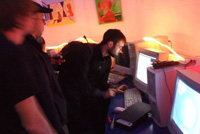

James Wallbank, founder of Access Space, talks about the British initiative of social transformation through technology that ranges from the reutilization of computers to the production of digital innovation
James Wallbank, founder of Access Space, talks about the British initiative of social transformation through technology that ranges from the reutilization of computers to the production of digital innovation.
James Wallbank, founder of Access Space, talks about the British initiative of social transformation through technology that ranges from the reutilization of computers to the production of digital innovation.

James Wallbank, founder of Access Space, talks about the British initiative of social transformation through technology that ranges from the reutilization of computers to the production of digital innovation
By Heitor Shimizu
Agência FAPESP – Creating opportunities for economic and social transformation through the use (and reuse) of technology is the objective of Access Space, an electronic training center in Sheffield, located in the third most populous district in England.
Known as “The Steel City”, Sheffield has been hard hit by the ongoing economic crisis, with unemployment rates surpassing 10%. At the same time, in the past decade the city has witnessed a growing problem with mounting electronic trash heaps due to the rapid obsolescence of computers and other digital devices.
This scenario led artist James Wallbank and his friends to create the Access Space in 2000. “The center began amidst an excess of old computers and a lack of job opportunities and professional development in the region. The idea was to have a radical and sustainable response to the problems of industrial decline and social displacement,” explained Wallbank.
The founder and director of Access Space was in São Paulo in early February, when he spoke with Agência FAPESP. Access Space has only six staff members, but it has dozens of volunteers and approximately 12,000 users per year. “We are a ‘fab lab,’ a community laboratory for digital fabrication focused on social development and entrepreneurship,” said Wallbank.
The idea is not to compete with larger industry or mass production but to allow people to create their own products, adapted to specific and particular uses that would be considered economically infeasible by traditional manufacturers. The concept of a fab lab originated in the Media Lab of the Massachusetts Institute of Technology (MIT).
“We began through reutilization of computers that were considered broken, obsolete or without value. We refurbished the machines, and, mainly, made adaptations so that they could not only work again, but be employed in the development of digital innovation and capacity building for users,” said Wallbank.
The computers were formatted to run Linux, a free and collaborative operating system, and have free or open source software.
“Access Space has never spent money on hardware or software, and the model has inspired projects in several countries throughout Europe and in Brazil,” explained Wallbank. In Brazil, the best-known initiative is MetaReciclagem, created in 2002, which won the Ministry of Culture’s Prêmio Ponto de Mídia prize in 2009. MetaReciclagem’s motto is “deconstructing technology for social transformation.”
According to Wallbank, Access Space is a free digital laboratory open to all people who want to conduct technical and creative projects and who can contribute to the formation and maintenance of a community of users. “The people who were trained yesterday are now developers of innovation and teach new participants,” he said.
“Access Space mobilizes the community for development of new models of technological transfer, personal growth and urban regeneration, at the same time that it defends more sustainable, inclusive and creative relationships with technologies,” he commented.
In 2012, Access Space expanded into a new unit with the opening of Refabspace, the first fab lab in Sheffield. The digital laboratory has computers and other equipment such as a laser cutter, welding stations, computer controlled tools and digital embroidery machines.
“We are learning to manage and develop solutions in diverse technologies, with 3D printing, through which we can now produce small quantities of plastic parts,” said Wallbank.
More information is available at: http://access-space.org.
Republish
The Agency FAPESP licenses news via Creative Commons (CC-BY-NC-ND) so that they can be republished free of charge and in a simple way by other digital or printed vehicles. Agência FAPESP must be credited as the source of the content being republished and the name of the reporter (if any) must be attributed. Using the HMTL button below allows compliance with these rules, detailed in Digital Republishing Policy FAPESP.





